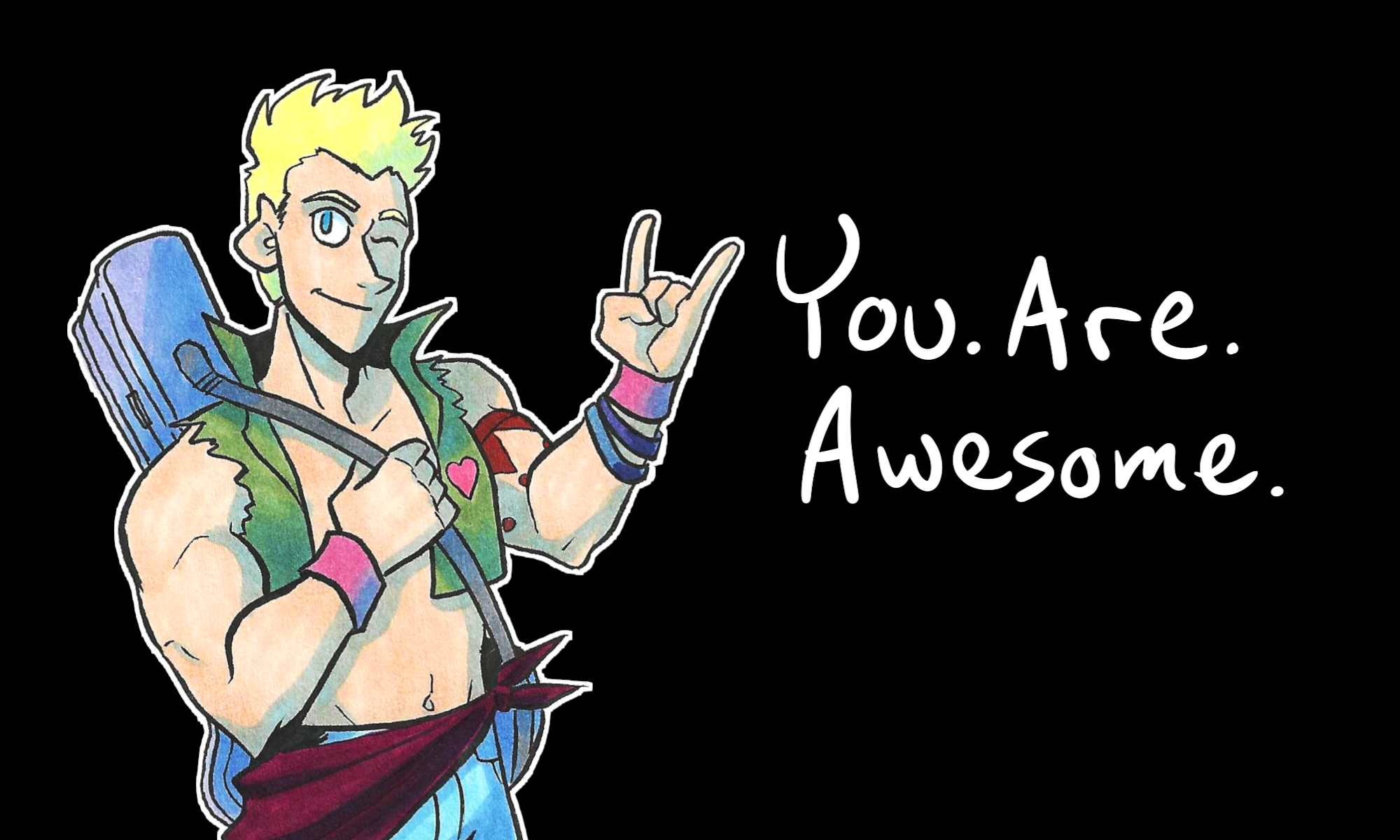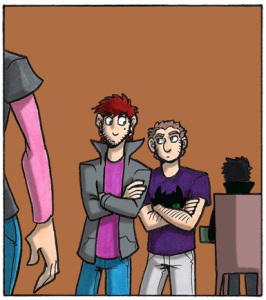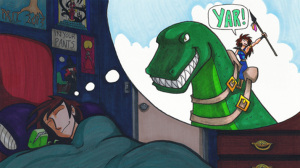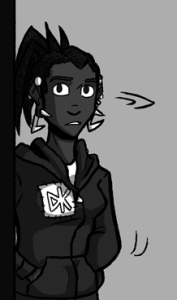There’s been some… “intense discussions” online about “including” women, people of color, and other minorities in fiction.
These discussions include articles all over the internet, Twitter hashtags, and a good chunk of GamerGate.
The discussions I have witnessed seem to boil down to “We need more diverse books” vs “writing about minorities is hard and uninteresting, so let’s stick with something comfortable.”
Here’s what I have to say about it.
Saying that writing stories with minorities in them – much less as lead characters – is “hard,” shows a tremendous lack of imagination and empathy. Even, I daresay, an unwillingness to try and empathize with them.
Now, you’re probably thinking, “But I’m not a black woman/asian person/lesbian/gay man/blind person/ etc. and I don’t want to write something and risk offending them by saying something wrong.”
And that’s a fair enough concern. Everyone’s experience is different. My view on life as a poor white genderqueer person sexually attracted to dudes is very different from, say, a black lesbian woman, or a wealthy white heterosexual man, or…you get the idea.
Should that deter us from trying to understand the point of view we want to write, that is outside of our realm of experience? No.
If anything, it should encourage us.
Part of the fun and challenge of writing any character (that is not a white man) is that you can talk to people of that demographic, and learn about them. And you take what you learned and make stories with that knowledge.
Even if you don’t do the research, you’re still a step ahead of those who won’t even write these types of characters. Just the act of writing characters outside of your experience is rebellious and rewarding.
Here’s the thing: I love the comics I make. The main characters I draw include a young trans girl, a genderqueer elf policeman, and most recently, a young, black, goth punk woman.
Am I any of those? No.
Do I make stories starring these characters? Yep.
I write and illustrate these stories because I want to understand my characters. Making these stories helps me explore their world, what they experience, and how they feel about their experiences, because I don’t get that easily outside of fiction.
I do my best to research as much as I can. If I get something wrong, that’s ok – I learn something new everyday. And if I get to learn about people outside of my experience, that’s awesome!
In making these stories to seek understanding, it helps me become more empathetic to others out in the real world. It helps me understand the lives of others. It makes me want to listen and learn more about them.
Writing these fictions helps me to become more human.
That’s why I love making diverse comics, and why I believe we need more diverse media.
For those of you who want to stick to writing about white dudes, that’s ok. Just be warned that
1. There are already plenty of stories about white heterosexual men, because
2. mass media tries to make characters generic enough that the audience can empathize with them immediately and have traits that are desirable. So they make their main characters white men. They figure white men are simple enough and common enough to create that the audience can insert themselves into that character. However,
3. White men become the default main character because they fit mass media formulas so well. And therefore
4. It makes women and PoC main characters hard to empathize with because they are not the default main character and don’t fit the formulas very well.
Hank Green did a really good job of discussing this in regard to Batman. You can watch that video here.
And if you still have reservations about writing or even reading stories with minority characters, please check out this awesome speech by Gene Luen Yang. He made some truly excellent points. (If the video won’t work, here’s a transcript.)
Don’t be afraid to make diverse characters and stories!
If you have any reading suggestions for books starring minority characters, leave them in comments below!
Have any questions? Still have reservations? Voice them in comments, too!
Thanks for reading and I’ll see you on Friday.




> to make characters generic enough that the audience
> can empathize with them immediately
In my opinion, “to make characters generic” is the opposite of creating art and crafting stories.
The very purpose of reading or watching stories is that they are about people other than me; otherwise, I would just write a diary and read the old entries for entertainment all the time. So this “empathize … immediately” stuff is just BS.
I’m a straight cis white male, but my favorite FBI agent of all time is Clarice Starling (sorry, X-Files fans), my favorite assassin is Cataleya Restrepo, my favorite in-house investigator is Kalinda Sharma, and my favorite “Number One” is (looking around anxiously for TNG fans) of course Zoe Washburne.
And for the “empathize … immediately with the straight cis white male character” balderdash: That lawyer who makes tons of money, drives cool cars, beds gorgeous women effortlessly, was listed as “Chicago’s 17th most desired bachelor” and is kinda disturbed that he didn’t make the Top 10?
Yes, I can “immediately empathize” with that guy, because I know exactly how that feels …
Ok, now someone looking at my favorite female characters listed above might argue that there is a lot of fanservice involved. That is certainly true, I won’t deny that lack of fanservice is something that makes many “Guy Movies / Webcomics” less interesting for me.
But this does not invalidate the point that it’s all about the storytelling: The Silence Of The Lambs would not work with a male protagonist, and imagine how ridiculous Firefly would be with an all-male (except for you-know-who) crew.
Also, I want the ladies in my stories to be like you want your Daimler: S-Class. Smart, strong, sweet, and sexy. If you try to hold my interest with “generic” fanservice, you will – ok, lets keep this realistic – maybe succeed anyway, but to a much lesser degree.
I agree with a lot of your points, especially the idea of making characters generic being complete bullshit.
Formula writing, though, is something I’ve noticed A LOT with Hollywood films. I’ve talked with people who worked in Hollywood and they noticed that people in the business want something easy to replicate and easy to produce, which is why they tend towards movies with white male protagonists with formulaic stories.
Comics, thankfully, are NOT Hollywood, but there’s still a lot of stories with white guy protagonists. Thankfully things are changing, slowly but surely. Part of that, though, like Hank Green said in that video, is because comic companies have smaller production budgets and can therefore take more risks with their content.
And as for fanservice – to each creator their own. I personally am not huge into it, and seeing it in comics and shows tends to draw me out of the story pretty quickly. Like, I have a REALLY hard time getting into Kill La Kill and some DC titles because of the fanservice. But if the female character created is in charge of her sexuality and has the attitude of “My Body, My Rules,” it’s not an issue for me
You are certainly right about how marketing considerations will stomp down all my cute and clever arguments. Just because a concept is BS doesn’t mean it’s not the best bet to put your money on.
If Breaking Bad has taught us anything, apart from Cooking Success With The Ingredients Of Failure, it is that you can make a pile of money, literally, by selling people something that will destroy their brain.
Please note that I neither care about nor know anything about mainstream comics, and that in my comment I used the term fanservice in an extremely broad sense. Like, no offense to Christian, her writing is terrific, but I would probably not read Validation if you did not draw the girls so attractive.
There’s a difference between fanservice and drawing the characters cute. I draw them cute. Fanservice as I define it would be like showing off panty/crotch or cleavage shots purely for the viewer’s pleasure. I don’t do that (and if I did, I don’t do it intentionally).
But yeah, I tend to not read mainstream (read: Marvel/DC/Dark Horse) comics much anymore because the stories are so predictable and formulaic. There are exceptions, of course – like Ms. Marvel or Captain Marvel, or Image’s Rat Queens, but there’s still not a lot of stories like those in comics. I hope it changes in the future, but progress is SO SLOW.
Probably because comics take FOREVER to make.
> If you have any reading suggestions
Sorry, forgot about that in my first comment.
A Girl And Her Fed
Galaxion